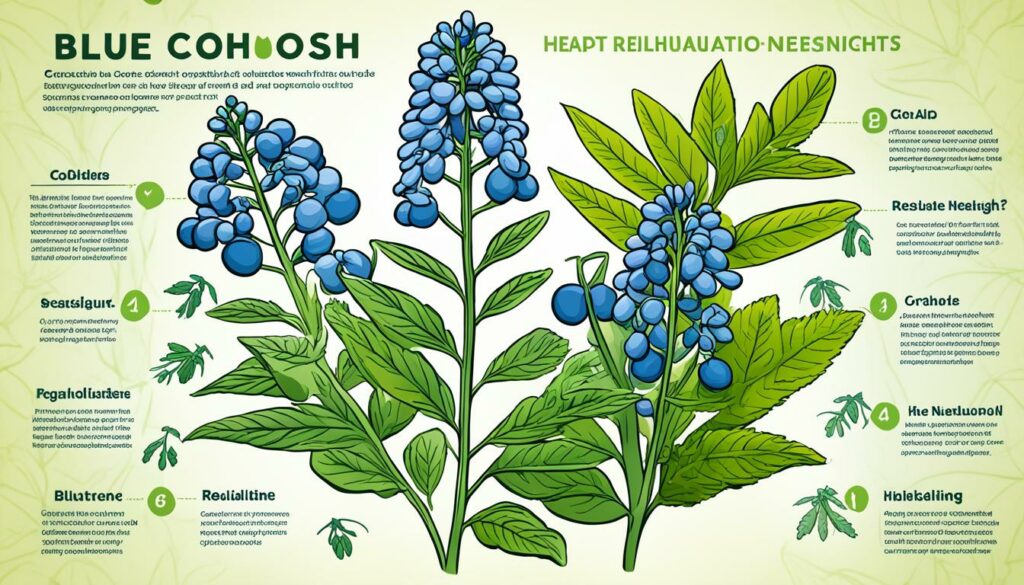Welcome to our comprehensive guide on Blue Cohosh, a powerful herbal supplement known for its numerous uses and benefits. Whether you’re seeking relief from menstrual disorders, looking to support your reproductive health, or exploring natural remedies for labor induction, Blue Cohosh may offer potential solutions.
Blue Cohosh, also known as Caulophyllum thalictroides, has a rich history in traditional medicine, particularly in Native American cultures. This versatile herb is renowned for its medicinal properties and is widely used in herbal medicine practices worldwide.
Studies suggest that Blue Cohosh possesses anti-inflammatory, antispasmodic, and analgesic properties, making it a popular choice for addressing menstrual cramps, premenstrual syndrome, and menopausal symptoms. Its hormone-regulating effects may also provide benefits for reproductive health and fertility.
However, it’s crucial to note that like any herbal supplement, Blue Cohosh should be used responsibly and under the guidance of a healthcare professional. While it offers potential benefits, improper dosage or prolonged use can lead to adverse reactions and side effects.
Throughout this guide, we’ll delve deeper into the various uses of Blue Cohosh, its role in herbal medicine, and its potential health benefits. We’ll also explore its traditional uses, scientific research, regulatory aspects, and more.
Remember, your health is precious, and making informed decisions is crucial to your well-being. Let’s dive into the world of Blue Cohosh and uncover its incredible potential.
Blue Cohosh for Women’s Health
Blue Cohosh is a valuable herb in promoting women’s health and addressing various menstrual disorders. Its antispasmodic properties make it an effective natural remedy for relieving menstrual pain and reducing the severity of symptoms associated with hormonal fluctuations. This herb has been traditionally used to alleviate menstrual cramps and premenstrual syndrome, providing much-needed relief during menstruation.
Moreover, Blue Cohosh is renowned for its potential to facilitate labor induction in pregnant women. It is believed to stimulate contractions and support a timely birth when the body is ready. However, it is important to remember that the use of Blue Cohosh for labor induction should only be undertaken under the guidance of a healthcare professional.
Aside from menstrual health and labor induction, Blue Cohosh can also play a significant role in overall reproductive health. It is commonly utilized to support fertility, regulate hormonal imbalances, and nurture reproductive well-being. This herb has been valued for generations due to its potential to address various concerns related to women’s reproductive systems.

Benefits of Blue Cohosh for Women’s Health:
- Relieves menstrual cramps and premenstrual syndrome symptoms
- Supports labor induction
- Promotes reproductive health and fertility
“Blue Cohosh has been a game-changer for managing my menstrual pain. I no longer rely on over-the-counter medication, and it has made a noticeable difference in my comfort during that time of the month.” – Sarah, 32
It’s important to note that while Blue Cohosh offers potential benefits, it should be used with caution and under the guidance of a healthcare professional. Each individual’s circumstances and medical history are unique, and professional advice is crucial in determining the appropriate use of this herbal supplement.
Traditional Uses of Blue Cohosh
Blue Cohosh has a long history of traditional use in Native American medicine. It has been highly regarded for its medicinal properties and has been employed to address various ailments and conditions.
- Menstrual Cramps: Blue Cohosh has been used to alleviate the discomfort associated with menstrual cramps, providing relief and easing the pain.
- Rheumatism: Traditionally, Blue Cohosh has been used to treat rheumatism, a condition characterized by inflammation and pain in the joints and muscles.
- Snake Bites: In some Native American cultures, Blue Cohosh has been employed as a remedy for snake bites, with the belief that it can counteract the venom and promote healing.
- Reproductive Health: Blue Cohosh has a longstanding association with supporting women’s reproductive health. It has been used to regulate menstrual cycles, ease menstrual discomfort, and assist in the transition through menopause.
With its anti-inflammatory and analgesic properties, Blue Cohosh has been valued for its ability to alleviate pain and inflammation in the body. Its traditional uses highlight the plant’s versatility and its significance in Native American healing practices.
While traditional uses provide important historical context, it is essential to consult with a healthcare professional before using Blue Cohosh or any herbal supplement to ensure safe and appropriate use.
The Traditional Uses of Blue Cohosh in a Nutshell:
| Ailment/Condition | Traditional Use |
|---|---|
| Menstrual Cramps | Alleviating discomfort and pain associated with menstrual cramps |
| Rheumatism | Treating inflammation and pain in joints and muscles |
| Snake Bites | Countering the effects of venom and promoting healing |
| Reproductive Health | Regulating menstrual cycles, easing menstrual discomfort, and supporting menopause transition |

Blue Cohosh in Herbal Medicine
Blue Cohosh is a popular herb used in herbal medicine for its various health benefits. It is commonly formulated into supplements, capsules, tablets, tinctures, extracts, teas, and oils.
In herbal medicine, Blue Cohosh is often used to:
- Relieve menstrual cramps
- Balance hormone levels
- Support reproductive health
- Promote overall wellness
Blue Cohosh has been traditionally used for centuries and is known for its effectiveness in addressing women’s health issues and promoting hormonal balance. It is believed to have anti-inflammatory, antispasmodic, and analgesic properties that can help alleviate menstrual discomfort and regulate hormone levels.
However, it is important to note that herbal supplements, including Blue Cohosh, are not regulated by the FDA. Therefore, it is crucial to choose products from reputable sources to ensure safety and quality.

img {
display: block;
margin-left: auto;
margin-right: auto;
}
Health Benefits of Blue Cohosh
Blue Cohosh is a herbal supplement with a wide range of potential health benefits. Its medicinal properties include anti-inflammatory, antispasmodic, and analgesic effects, which can help alleviate pain and reduce inflammation in the body.
The regulation of hormones is another significant advantage attributed to Blue Cohosh. This can be particularly helpful for women dealing with menstrual disorders or menopausal symptoms, as it may assist in hormone regulation and provide relief.
Furthermore, Blue Cohosh has been linked to improved fertility and a decreased risk of certain cancers. Its ability to aid digestion and boost the immune system further adds to its potential health benefits.
While Blue Cohosh shows promise in these areas, it’s essential to note that further research is needed to fully understand and confirm its potential health benefits. Consulting with a healthcare professional before using Blue Cohosh is crucial to ensure its appropriateness for individual needs and circumstances.
Explore the table below to gain further insight into the potential health benefits of Blue Cohosh:
| Health Benefit | Description |
|---|---|
| Reduced Pain and Inflammation | Blue Cohosh’s anti-inflammatory and analgesic properties may help alleviate pain and reduce inflammation in the body. |
| Hormone Regulation | Blue Cohosh is believed to have hormone-regulating effects, which can be beneficial for women experiencing menstrual disorders or menopausal symptoms. |
| Improved Fertility | Blue Cohosh may enhance fertility and increase chances of successful conception. |
| Reduced Risk of Certain Cancers | Research suggests that Blue Cohosh may help reduce the risk of certain cancers, although further studies are needed. |
| Enhanced Digestion | Blue Cohosh has been associated with improved digestion and may support overall gastrointestinal health. |
| Boosted Immune System | Blue Cohosh may help strengthen the immune system, helping the body defend against infections and illnesses. |

Dangers of Blue Cohosh
While Blue Cohosh can provide health benefits, it is important to be aware of the potential dangers associated with its use. Taking Blue Cohosh in large doses or for long periods of time can result in side effects such as nausea, vomiting, dizziness, headaches, and liver damage.
Table: Side Effects of Blue Cohosh
| Side Effects | Description |
|---|---|
| Nausea | Feeling of sickness in the stomach |
| Vomiting | Forcefully expelling the stomach contents through the mouth |
| Dizziness | Sensation of lightheadedness or unsteadiness |
| Headaches | Pain or discomfort in the head or neck region |
| Liver Damage | Injury or dysfunction of the liver |
Moreover, Blue Cohosh can also interact with certain medications, so it is crucial to consult with a healthcare professional before using Blue Cohosh, especially if you are pregnant or have any underlying medical conditions. Pregnant women should avoid using Blue Cohosh, as it can cause birth defects.

It is always important to prioritize your health and to seek guidance from healthcare professionals when considering the use of any herbal supplement.
Products Containing Blue Cohosh
Blue Cohosh can be found in various forms, including capsules, tablets, tinctures, extracts, teas, and oils. These products are commonly available in health food stores, herbal shops, and online retailers. It is important to choose products from trusted sources and ensure that they are of high quality and purity. Reading product labels and following recommended dosages is essential for safe and effective use of Blue Cohosh products.

Key Products Containing Blue Cohosh:
| Product Type | Benefits |
|---|---|
| Capsules | Convenient and easy to swallow |
| Tablets | Pre-measured dosages for precise supplementation |
| Tinctures | Concentrated liquid extract for fast absorption |
| Extracts | Potent formulations for targeted effects |
| Teas | Infusions for a soothing and nourishing experience |
| Oils | Topical application for localized relief and massages |
When selecting Blue Cohosh products, it is crucial to prioritize quality and purity. Ensure that the products you choose come from trusted sources and undergo rigorous testing for safety and efficacy. This way, you can confidently incorporate Blue Cohosh into your wellness routine and experience the potential benefits it has to offer.
Regulation of Blue Cohosh
The regulation of Blue Cohosh varies across different countries. Let’s take a look at how it is regulated in some key regions:
United States
In the United States, Blue Cohosh is regulated as a dietary supplement by the FDA (Food and Drug Administration). This means that Blue Cohosh products are not subject to the same rigorous testing and approval process as prescription medications. However, manufacturers are required to meet certain labeling requirements and ensure product safety.
European Union
In the European Union, Blue Cohosh is regulated as a traditional herbal medicinal product by the EMA (European Medicines Agency). This means that Blue Cohosh products must meet specific quality, safety, and efficacy standards set by the EMA. They are also subject to rigorous testing and clinical trials before they can be marketed as herbal remedies.
Canada
In Canada, Blue Cohosh is regulated as a natural health product by Health Canada. This means that Blue Cohosh products must meet specific safety and efficacy requirements and are subject to pre-market review and approval. Health Canada provides guidelines for the production, labeling, and advertising of natural health products, including Blue Cohosh.
Australia
In Australia, Blue Cohosh is regulated as a complementary medicine by the TGA (Therapeutic Goods Administration). Complementary medicines, including Blue Cohosh products, must be listed or registered with the TGA before they can be marketed. The TGA ensures the safety, quality, and efficacy of complementary medicines through a thorough evaluation process.
These regulatory bodies play a crucial role in ensuring the safety and quality of Blue Cohosh products. By enforcing guidelines and standards for production, labeling, and safety, they aim to protect consumers and provide them with reliable and effective herbal remedies. It is important to choose Blue Cohosh products that comply with these regulations to ensure their safety and efficacy.

Scientific Studies on Blue Cohosh
Scientific studies on Blue Cohosh have been conducted to explore its potential therapeutic effects and safety. These studies aim to shed light on the efficacy of Blue Cohosh and provide valuable insights into its uses and benefits.
Several scientific investigations have focused on the use of Blue Cohosh in women’s health. These studies have examined its effectiveness in treating menstrual disorders, such as menstrual cramps and premenstrual syndrome. Additionally, research has explored Blue Cohosh’s role in supporting reproductive health, including its potential benefits for fertility and hormonal balance.
Furthermore, studies have explored the effects of Blue Cohosh on hormone regulation, inflammation, and analgesia. These investigations aim to uncover the mechanisms through which Blue Cohosh may exert its therapeutic effects, providing a deeper understanding of its potential applications.
While there is some evidence supporting the use of Blue Cohosh for certain conditions, it is important to note that further research is still needed. Additional studies are necessary to validate these findings and determine the optimal dosages and treatment durations for maximum effectiveness.

[Image Description: A visually appealing scientific image relevant to the topic of Blue Cohosh. The alt attribute contains the keyword “scientific studies on Blue Cohosh.”]
Adverse Reactions and Side Effects of Blue Cohosh
While Blue Cohosh may offer health benefits, it’s important to be aware of the potential adverse reactions and side effects associated with its use. It’s always recommended to consult with a healthcare professional before using any herbal supplement, including Blue Cohosh.
Common side effects of Blue Cohosh include:
- Nausea
- Vomiting
- Dizziness
- Headaches
- Liver damage
Additionally, Blue Cohosh has the potential to interact with certain medications. If you’re taking any prescription or over-the-counter drugs, it’s important to discuss the use of Blue Cohosh with your healthcare provider to avoid any potential interactions.
Individuals with liver or kidney disease should exercise caution when using Blue Cohosh, as it may further impact these organs. Pregnant women should avoid the use of Blue Cohosh due to the risk of birth defects.
Remember, the use of herbal supplements should always be approached with care and under the guidance of a healthcare professional. Prioritize your well-being and make informed decisions regarding your health.
Side Effects of Blue Cohosh
| Common Side Effects | Precautions |
|---|---|
| Nausea | Avoid large doses |
| Vomiting | Consult healthcare professional if experiencing severe symptoms |
| Dizziness | Avoid driving or operating heavy machinery |
| Headaches | Stay hydrated and rest |
| Liver damage | Avoid prolonged use |
Conclusion
In conclusion, Blue Cohosh is a versatile herbal supplement that has been used for centuries in traditional medicine. Its widespread use in treating menstrual disorders, supporting reproductive health, and inducing labor in pregnant women showcases its diverse range of potential benefits.
Blue Cohosh is believed to possess anti-inflammatory, antispasmodic, and analgesic properties, making it a popular choice for managing pain and inflammation. Its hormone-regulating effects also make it beneficial for women experiencing hormonal imbalances and menopausal symptoms.
While Blue Cohosh offers promising health benefits, it is essential to exercise caution when using this herb. Consulting with a healthcare professional is crucial as they can provide personalized guidance and ensure safe usage. Additionally, it is imperative to select high-quality Blue Cohosh products from reputable sources to ensure their effectiveness and safety.
In conclusion, Blue Cohosh continues to be a valuable herbal supplement with a rich history of traditional use. By using it responsibly and seeking professional guidance, you can harness its potential benefits for your overall well-being and women’s health needs.
FAQ
What are the uses and benefits of Blue Cohosh?
Blue Cohosh is used for various purposes, including treating menstrual disorders, supporting reproductive health, and inducing labor in pregnant women. It is believed to have anti-inflammatory, antispasmodic, and analgesic properties, as well as hormone-regulating effects.
How can Blue Cohosh benefit women’s health?
Blue Cohosh is commonly used to treat menstrual disorders such as menstrual cramps and premenstrual syndrome. It can help relieve menstrual pain and reduce the severity of symptoms associated with hormonal fluctuations. Blue Cohosh is also known for its use in labor induction, as it stimulates contractions and promotes timely birth. Additionally, Blue Cohosh supports reproductive health and fertility.
What are the traditional uses of Blue Cohosh?
Blue Cohosh has a long history of traditional use in Native American medicine. It has been used to treat conditions such as menstrual cramps, rheumatism, and snake bites. Traditional practitioners have also used Blue Cohosh to support women’s reproductive health and ease the transition through menopause.
How is Blue Cohosh used in herbal medicine?
Blue Cohosh is a popular herb used in herbal medicine for various health benefits. It is commonly formulated into supplements, capsules, tablets, tinctures, extracts, teas, and oils. However, it is important to choose products from reputable sources to ensure safety and quality, as herbal supplements are not regulated by the FDA.
What are the health benefits of Blue Cohosh?
Blue Cohosh is believed to have several health benefits, including reducing pain and inflammation, regulating hormones, improving fertility, reducing the risk of certain cancers, aiding digestion, and boosting the immune system. However, further research is needed to fully understand and confirm these potential health benefits.
Are there any dangers associated with Blue Cohosh?
Yes, Blue Cohosh can be dangerous if taken in large doses or for long periods of time. It can cause side effects such as nausea, vomiting, dizziness, headaches, and liver damage. It may also interact with certain medications. It is important to consult with a healthcare professional before using Blue Cohosh, especially if pregnant or if you have any underlying medical conditions.
What products contain Blue Cohosh?
Blue Cohosh can be found in various forms, including capsules, tablets, tinctures, extracts, teas, and oils. These products are commonly available in health food stores, herbal shops, and online retailers. Choosing high-quality products from trusted sources is essential.
How is Blue Cohosh regulated?
The regulation of Blue Cohosh varies across different countries. In the United States, it is regulated as a dietary supplement by the FDA. In the European Union, it is regulated as a traditional herbal medicinal product by the EMA. In Canada, it is regulated as a natural health product by Health Canada. In Australia, it is regulated as a complementary medicine by the TGA.
What scientific studies have been conducted on Blue Cohosh?
Scientific studies have been conducted on Blue Cohosh to explore its potential therapeutic effects and safety. Some studies have focused on its use in women’s health, including treating menstrual disorders and supporting reproductive health. Other studies have investigated its effects on hormone regulation, inflammation, and analgesia. However, further research is needed to validate these findings and determine optimal dosages and treatment durations.
What are the adverse reactions and side effects of Blue Cohosh?
Blue Cohosh can cause adverse reactions and side effects, including nausea, vomiting, dizziness, headaches, and liver damage. It may also interact with certain medications. Pregnant women should avoid using Blue Cohosh due to the risk of birth defects. It is important to consult with a healthcare professional before using any herbal supplement, including Blue Cohosh.
Source Links
- https://www.digicomply.com/dietary-supplements-database/blue-cohosh
- https://www.science.gov/topicpages/b/blue cohosh caulophyllum
- https://www.ncbi.nlm.nih.gov/pmc/articles/PMC8953734/

